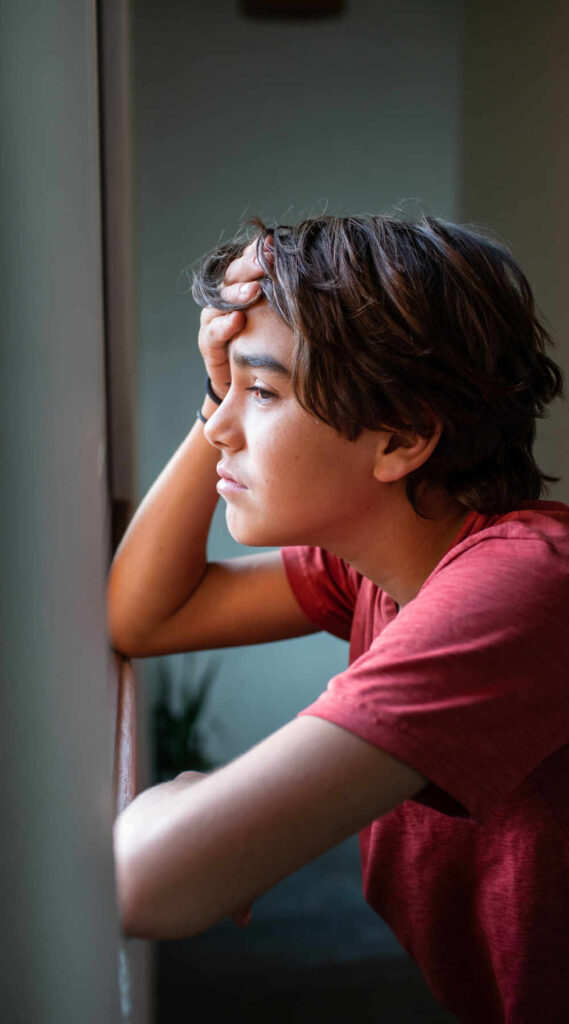Mental Health Intensive Outpatient Program (IOP) for Teens in Dallas, Texas
Learn More About Our Mental Health Intensive Outpatient Program (IOP) for Dallas Teens
INTENSIVE OUTPATIENT PROGRAM FOR TEENS IN THE GREATER DALLAS AREA
Our teens today are faced with a myriad of stressors that are largely unfamiliar to the generation that is raising them. These stressors are related to social media, technology, constant information overload, hybrid busy schedules, and academic challenges.1 These all-too-common issues can exacerbate mental health concerns and lead to troubling behavioral patterns. If your teen is having difficulties with day-to-day life related to stress, depression, anxiety, difficulty sleeping, or other challenges related to mental health and substance use, they may benefit from intensive outpatient treatment.
Offering greater success than individual outpatient therapy alone, intensive outpatient programs (IOP) provide a step up in care with several hours of daily treatment. By implementing evidence-based and comprehensive treatments under the guidance of our board-certified child and adolescent psychiatrist, BasePoint Academy can support your teen and your family through our integrated team approach. If your teen is struggling with the complex challenges that mental health concerns, behavioral health patterns, or substance use can cause, you can contact the experienced team of clinicians, therapists, and providers at BasePoint Academy. Schedule a complimentary and comprehensive assessment for dedicated support in the greater Dallas-Fort Worth region.
BasePoint Is Here to Help Teens and Texas Families
The teen years are an especially vulnerable time for young people. Teens with behavioral health or substance use issues may think, feel, and act in ways that are confusing, frightening, unmanageable, and even dangerous for both their parents and themselves.
A breakdown in family communication and functioning can lead to despair and hopelessness. BasePoint Academy is here to help. Our program provides customized treatment plans for teens who are experiencing difficulties that include abusing drugs or alcohol, anxiety, post-traumatic stress disorder, depression, and other mental health disorders.2
With reliable intensive outpatient treatment, holistic healthcare, teen-focused addiction treatment for co-occurring disorders, relapse prevention strategies, and our signature Resiliency Program, these challenges can be identified, addressed, and treated. The team at BasePoint Academy can help your teen develop practical coping skills, essential life skills, and valuable communication skills and assist them in navigating the wide variety of challenges that teens face today. If you are searching for an adolescent intensive outpatient program near me, call us today at (972) 357-1749. One of our trained professionals will help you schedule a complimentary assessment.

What Is an IOP for Teens?
An intensive outpatient program offers mental health treatment in a structured outpatient program using evidence-based teen counseling strategies that account for adolescent development, teenage emotions, and adolescent psychology. The intensive outpatient program at BasePoint Academy utilizes a comprehensive level of services to address mental health, behavioral health, or substance abuse treatment.
The board-certified mental health professionals and licensed counselors have expertise in teen therapy services and offer individualized teen counseling alongside group and family therapies. Teen peer pressure can trigger mental health disorders, including stress, anxiety, depression, and post-traumatic stress disorder. An intensive outpatient program offers your teenager the outpatient mental health services they need using a family-focused teen therapy approach to achieving teenage well-being.
Do Mental Health Facilities Offer IOP Adolescent Programs?
Not every intensive outpatient program in Texas specializes in applying adolescent psychology to their treatment plans. BasePoint Academy offers mental health treatment for young adults and adolescents that accounts for their adolescent development, teenage stress, and adolescent mental health issues that are commonly found in the teen years.
It is crucial to utilize teen mental health resources within a structured teen counseling environment to attain sustainable recovery. The intensive outpatient programs and mental health opportunities offered at BasePoint Academy include psychoeducational groups for teens and teenage resilience programs that include cognitive-behavioral therapy for teens. Emotional wellness programs and teenage support groups are added benefits at an adolescent-focused facility like BasePoint Academy.
Mental Health Treatment Admissions and Intake
Our complimentary assessment with a licensed clinician will provide you with a recommendation for the appropriate level of care for your teen struggling with mental health. We can also check your insurance coverage levels.
Call us today to schedule a complimentary same-day assessment at (972) 357-1749 or complete our inquiry form.
Find Out About Our Admissions
Type of Disorders Treated in a Mental Health Intensive Outpatient Program for Teenagers
Several types of mental health disorders can be successfully treated in a teen intensive outpatient program. The following is a list of examples of mental health conditions treated at BasePoint Academy, but it is not a complete list.
IOP for Depression Treatment for Teens
The adolescent years are tumultuous at best, and depression during adolescence is a serious mental health concern. Depression is more than feeling sad or blue for a couple of days. Your teenager can experience intense feelings of hopelessness, anger, or frustration that last at least two weeks, making it difficult to function normally in their everyday activities.
IOP for Anxiety Disorders Treatment for Teens
At some time, nearly everyone experiences anxiety. But, when anxiety becomes exaggerated and prolonged, it can trigger an anxiety disorder. Symptoms can vary depending on the teenager and the disorder. Typically, an adolescent with an anxiety disorder experiences excessive fear and worry and feelings of restlessness and hypervigilance. Teenagers describe feeling nervous or stressed even in the absence of a threat.
IOP for Bipolar Disorder Treatment for Teens
Bipolar disorder was once called manic depressive illness or manic depression. Teens with bipolar disorder experience severe mood swings, which are more than those normally experienced by teens. Mood swings could be a sign of bipolar disorder if they are extreme, affect a person’s energy level and behavior, or cause a significant problem in a person’s life.
IOP for Post-Traumatic Stress Disorder (PTSD) Treatment for Teens
Teenagers with PTSD have long-lasting symptoms after experiencing or witnessing a traumatic event. These events can include abuse, neglect, bullying, an accident, or the loss of a loved one. Symptoms can include flashbacks, nightmares, hypervigilance, and mood swings.
IOP for Borderline Personality Disorder (BPD) Treatment for Teens
Borderline personality disorder is a mental health condition in which your teenager experiences extreme mood swings, trouble controlling their emotion, and unstable relationships. Teenagers with borderline personality disorder have a higher risk of suicide and self-destructive behaviors. Many times, a borderline personality disorder begins in the teen years as personality develops and matures.
The difference between bipolar disorder and borderline personality mood swings is that people with borderline personality have rapid mood swings in response to stress, whereas people with bipolar disorder experience more sustained and less reactive mood swings.
IOP for Self-harming Behaviors
Teens with self-harming behaviors typically cut themselves with a sharp object such as a knife, razor, or fingernails. In most instances, self-harming behavior is not driven by suicidal thoughts or behavior but rather a teen’s desire to distract themselves from troubling thoughts by causing themselves physical pain.

Do Intensive Outpatient Programs Offer Dual Diagnosis Treatment in Texas?
Yes, intensive outpatient programs in Texas offer dual diagnosis treatment for teenagers. BasePoint Academy offers an intensive outpatient program to address teens’ mental health issues from an adolescent development focus. Dual diagnosis is a term used to describe when an individual has a substance use disorder and a co-occurring mental health condition.
Dual diagnosis is not a separate diagnosis.Treatment for dual diagnosis is complex and must be addressed concurrently to reduce the potential for relapse, build teenage resilience, and promote sustainable recovery. For more information about BasePoint Academy’s specialization in adolescent care, call BasePoint Academy at (972) 357-1749 or contact us online. The admission specialist can verify your insurance coverage, answer your questions about adolescent therapy and individualized team counseling, and estimate your out-of-pocket costs for treatment.
Does Insurance Cover Intensive Outpatient Programs for Teens in Texas?
Yes, health insurance policies cover intensive outpatient programs for teenagers in Texas when your teenager benefits from your health insurance plan. In 2010, the Affordable Care Act mandated that all insurance policies issued after 2010 include coverage for essential health services, such as mental health conditions and substance use disorders.
However, not all policies offer the same benefits and limitations. Your policy may limit the number of therapy and counseling sessions your teenager may have per incident, year, or lifetime. Identifying the policy benefits that cover mental health rehabilitation can be challenging. The easiest way to determine your benefits and limits is to call BasePoint Academy at (972) 357-1749.
What Is Offered In a Teen Intensive Outpatient Treatment Program?
Our intensive outpatient treatment program for mental health, behavioral health or substance abuse treatment will offer daily treatment for your pre-teen or teenage child. Some therapies include the option for faith-based treatment. While each patient’s treatment plan is customized to meet their unique needs, some of the outpatient services we offer at our teen recovery center include:
- Medication Management
- Experiential Therapies
- Individual Therapy
- Cognitive Behavioral Therapy (CBT)
- Motivational Interviewing (MI)
- Dialectical Behavior Therapy (DBT)
- Family Therapy
- Solution-Focused Therapy
- Psychopharmacology
- Group Therapy for Peer Support
- Psychodynamic Therapy
- Trust-Based Relational Intervention (TBRI)
- Aftercare Plans
Our IOP Program Can Help Your Teen with the Following Mental Health Disorders, Symptoms, And Experiences
- Stress
- Anxiety
- Depression
- Oppositional Defiant Disorder
- Post-Traumatic Stress Disorder
- Substance Use
- LGBTQ+
- Other mental health conditions

Does BasePoint Academy Accept health Insurance?
Yes, we accept most major health insurance providers in Texas and can check your treatment coverage levels on your behalf.
TEENAGE MENTAL HEALTH TREATMENT CENTERS NEAR ME IN DALLAS, TEXAS
Base Point Academy has several treatment facilities in the Dallas-Fort Worth area, including in Arlington, Forney, and McKinney, Texas. Each of these luxury facilities offers the same level of care from licensed mental health professionals whose focus is providing teenagers with the tools and resources they need to heal and support sustainable recovery from depression and other mental health conditions.
- Arlington, Texas: 3900 Arlington Highlands Blvd, Suite 237, Arlington, TX 76018
- Forney, Texas: 713 W Broad St, Suite 200, Forney, TX 75126
- Frisco, Texas: 8275 Judges Way, Suite 100I, Frisco, TX 75036
- McKinney, Texas: 4733 Medical Center Drive, McKinney, TX 75069

Contact BasePoint Academy Today
Contact us today to schedule a free confidential assessment for your teen with a licensed clinician.
You can also get in touch to talk with our mental health experts about treatment needs, care options and your insurance coverage levels.
Call: (972) 357-1749Check Your Insurance
IS INTENSIVE OUTPATIENT TREATMENT RIGHT FOR MY TEEN?
- Your teen cannot concentrate at home or at school
- Your teen has shown suicidal tendencies or made suicidal comments3
- Your teen is being bullied
- Your teen struggles in school and has seen a decline in their grades
- Your teen’s sleeping or eating habits have changed
- Your teen has lost interest in activities or sports they once loved
- Your teen has persistent moods or attitudes (anger, irritability, sadness, hopelessness, depression, or anxiety)
- Your teen is in outpatient therapy right now but needs something more intense then once a week therapy
What Is the Teen Mental Health IOP Admissions Process?
Once you have determined the intensive outpatient program your teenager will attend, they will go through an admission process. The process can be different depending on the program and the facility. However, the admission process is always about ensuring that your adolescent gets the best possible care to treat their mental health condition. These are some of the steps that typically occur during admission.
- Initial Assessment: When you call BasePoint Academy, you can request a free initial assessment. This assessment can be done over the phone and helps determine if your teenager requires outpatient mental health services and youth counseling.
- Insurance Verification: During the initial conversation, our admissions specialist can verify your insurance coverage, determine if prior authorization is needed before treatment, and help estimate out-of-pocket costs.
- Intake Appointment: If you and your teenager decide to seek treatment at BasePoint Academy, your teen will undergo a medical evaluation and psychological assessment.
- Treatment Planning: The assessment during the intake appointment is the foundation for a customized treatment plan in which your teenager can access individual, family, and group therapies.
- Program Orientation: Before admission, you and your teenager can have an orientation to the facility and the program.
- Treatment: During treatment, your adolescent is expected to participate actively, and our licensed staff will evaluate their progress and modify the program as necessary.

What Is the Intensive Outpatient Program for Teens Treatment Process?
An intensive outpatient program for teenagers offers individualized teen counseling, cognitive-behavioral therapy for teens, and helps teach coping skills for adolescents. An intensive outpatient treatment program is a comprehensive outpatient program that offers your teen what they need in the least restrictive environment so they can learn new skills and return home at night to practice them.
The IOP program at BasePoint Academy is customized to meet your teen’s unique needs, including medication management, education counseling, and aftercare plans. When your teenager needs more than once-a-week therapy to overcome a mental health disorder, call BasePoint Academy to learn more about the intensive outpatient program.
How Much Does IOP for Adolescents Cost?
Teen IOP mental health costs vary depending on several factors. When you identify an intensive outpatient mental health program near me, the financial counselor at the facility can offer information about the treatment costs that are related to the intensity of therapy your teenager requires. After the cost of a mental health adolescent IOP near me is identified, your out-of-pocket costs depend on your insurance coverage.
While all health insurance plans are mandated to cover mental health and substance use disorder treatment, all policies have varying benefits and limitations. The easiest way to identify the benefits and limitations of your policy is to call BasePoint Academy at (972) 357-1749. The admission specialist will check your insurance coverage and determine if prior authorization is required. They can also help you with figuring out how to pay for IOP treatment for your teen.
Statistics on Intensive Outpatient Programs in Texas
Intensive outpatient programs offer direct services for teenagers and young adults with mental health conditions and substance use disorders who do not require 24-hour supervision or detoxification. Data show that care in an appropriate intensive outpatient program is as effective as inpatient treatment programs.
These programs have a positive impact on healthcare utilization and cost. The Texas substance use disorder treatment programs funded services for 27,549 people in 2019, and a Connecticut study found those with substance use disorder had an average length of stay of just over 41 days, attending an IOP three days a week.
Statistics on Mental Health for Teens and Adolescents in Texas
- In 2020, more than 500,000 children in Texas were diagnosed with anxiety or depression. The most commonly diagnosed mental disorders in children include attention deficit hyperactivity disorder, ADHD, depression, and behavior problems.
- The diagnosis of depression and anxiety has increased over time. According to Mental Health America, 15.08% of people aged 12 to 17 reported having at least one major depressive episode in the past year. Left untreated, childhood depression is more likely to persist in adulthood.
- According to Mental Health America, roughly 60% of youth with major depression did not receive mental health treatment and only 27.2% of those with severe depression received some consistent treatment.
- According to the National Alliance on Mental Illness, 1 in 6 children and adolescents aged 6 to 17 years experience at least one mental health disorder each year, and 50% of all lifetime illnesses begin by age 14.
- Roughly 13% of young adults aged 18-25 and 22% of high school students have serious thoughts of suicide. An estimated 45%, or more than double the number, of LGBTQ young adults seriously consider suicide, and lesbian, gay, and bisexual youth are nearly four times more likely to attempt suicide than their straight counterparts
Sources
- World Health Organization. (n.d.). Mental health of adolescents. World Health Organization. Retrieved from https://www.who.int/news-room/fact-sheets/detail/adolescent-mental-health# on May 2, 2023
- Twenge, J. M. (2019). Current Opinion in Psychology, 32, 89–94. Why increases in adolescent depression may be linked to the technological environment. Retrieved from https://www.sciencedirect.com/science/article/abs/pii/S2352250X19300880 on May 2, 2023
- Centers for Disease Control and Prevention. (2023, March 8). Data and statistics on children’s Mental Health. Centers for Disease Control and Prevention. Retrieved from https://www.cdc.gov/childrensmentalhealth/data.html on May 2, 2023
Effective Teen Mental Health IOP Treatment With BasePoint Academy
We can help your teen and your family address and overcome mental health concerns with expert care and a safe environment. Call today to discover the treatment for long-term healing.









